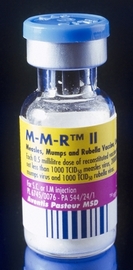The vaccine against mumps – The vaccine against mumps
What is mumps?
Mumps is a highly contagious infection. It results in fever and swelling of the parotid glands, which are located closer to the front of the ear. Mumps is caused by a virus.
Virus It is usually spread through contact with the saliva of an infected person. Since mumps virus is highly contagious, it spreads rapidly among people in their close contact.
Once a common childhood illness, mumps is now rare in developed countries, mainly due to the use of the vaccine, which provides lifelong immunity.
Symptoms include mumps:
- Painful swelling of the parotid glands (under the cheeks and jaw);
- Fever;
- Sore throat;
- Headache;
- Kryvosheya;
- Nausea and vomiting;
- Drowsiness;
- Swelling and pain under the tongue, jaw, or front side of the chest;
- Men: painful inflammation of the testicles;
- Women: ovaritis, resulting in pain or abdominal pain.
In some cases, no symptoms, but usually the symptoms of mumps occur through 2-3 weeks after infection.
There are no medicines or specific treatments for mumps. Since the disease is caused by a virus, it can not be cured with antibiotics. When mumps should not take aspirin. Treatment is focused on reducing symptoms and may include:
- Imposition of hot or cold compresses to swollen area;
- Gargling with warm salt water;
- The use of painkillers, not containing Aspirin;
- The use of fever-reducing medicines (paracetamol, Ibuprofen);
- Drinking plenty of fluids;
- Avoid caustic or acidic drinks (Orange juice, lemonade, etc.);
- Bland diet.
What is the vaccine against mumps?
Mumps vaccine is administered in combination with other vaccines:
- Measles and rubella – MMR;
- Measles, rubella, and varicella (vetryanki) – MMRV.

Who and when to be vaccinated against mumps?
All children (with some exceptions), You should be vaccinated twice:
- IN 12-15 months;
- IN 4-6 years (before entering school) – Vaccination can be performed before, but the introduction of doses of vaccine should be carried out with a difference at least four weeks.
The vaccine may also be administered to children 6-11 months, if they travel abroad. These children should also get vaccinated at the age of two 12-15 months 4-6 years.
Persons aged 18 years and younger, who were not vaccinated, administered two doses of MMR vaccine, with a difference of four weeks.
Adults, who were born after 1957 year, and which have not previously been vaccinated, perhaps, required 1-2 doses. Talk to your doctor, If you have not previously been vaccinated.
Risks, associated with the vaccine against mumps
As with any vaccine, MMR vaccine can cause serious problems, such as severe allergic reactions. Although most people do not experience any problems, sometimes can be felt:
Soft issues: fever, mild rash or swelling of glands in the cheeks and neck;
Moderate problems: seizure caused by fever, Temporary pain and stiffness in the joints, and a low platelet count;
Rarely: severe allergic reactions.
Who should not be vaccinated against mumps?
Vaccination is not necessary in the following cases:
- If there were life-threatening allergic reaction to gelatin, antibiotic neomycin, or to a previous dose of MMR vaccine;
- There is a moderate or strong malaise – wait, as long as you do not recover;
- In the presence of pregnancy vaccination should be carried out after giving birth. If you are trying to get pregnant, must wait four weeks after vaccination.
Talk to your doctor, before introducing MMR vaccine, if you have:
- Disease, that affects the immune system (eg, HIV / AIDS);
- Taking medications, which affect the immune system (eg, steroids);
- Cancer or cancer of lechitesy;
- Low content of blood platelets;
- Blood transfusion.
What other ways besides vaccination can prevent mumps?
In addition to the administration of the vaccine the best way to prevent mumps – avoid contact with an infected person.
What happens in the event of an outbreak of mumps?
Cases of mumps must be reported by health authorities. If you suspect, that you or your child is sick with mumps, tell your doctor.
If you have not been vaccinated, you need to be vaccinated.
